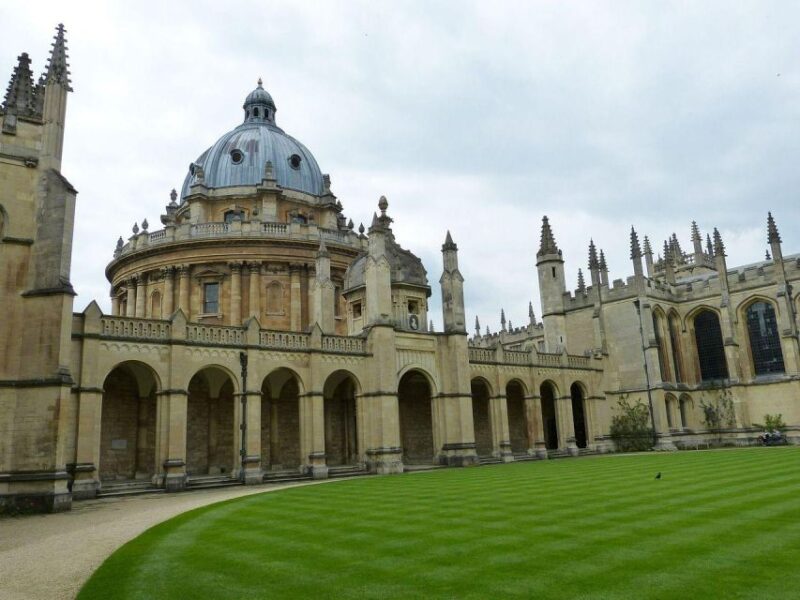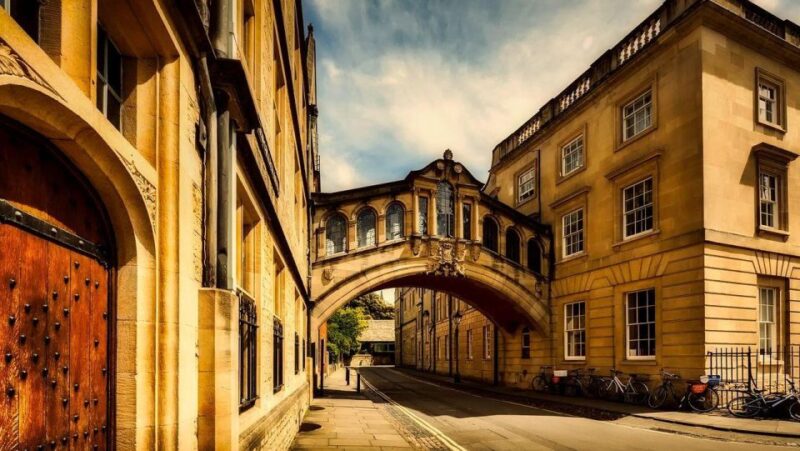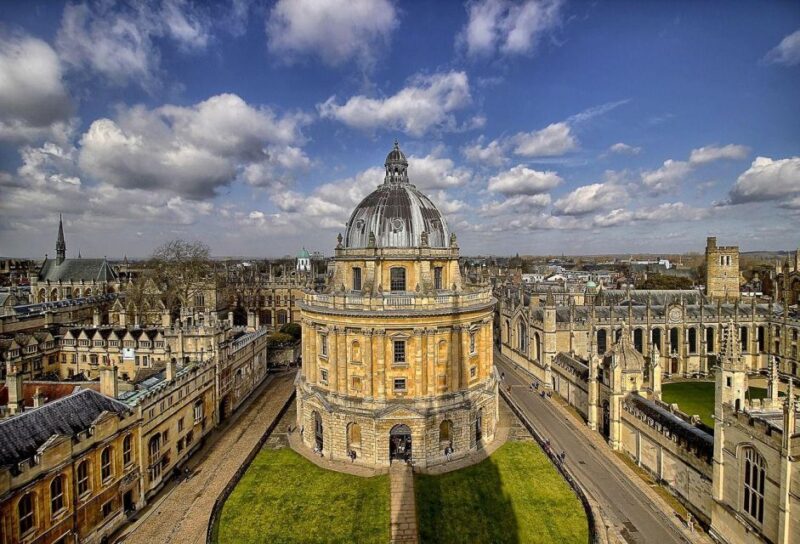Explore the hallowed halls and storied past of Oxford University on a private guided walking tour. Enjoy the institution’s architectural wonders, from Keble College’s striking Neo-Gothic design to the enduring legacies of colleges like Balliol and Corpus Christi. Uncover the self-governing college model that has preserved Oxford’s rich heritage, and discover the university’s pivotal role in shaping history – from King Alfred’s legendary foundation to the college’s contributions to the King James Bible. With fierce collegiate rivalries and a multifaceted tapestry of stories, this tour promises an in-depth exploration that will leave you captivated by the enduring allure of one of the world’s most prestigious educational institutions.
Key Points

- Experience Oxford University’s rich history and architectural diversity through a private guided walking tour.
- Explore the unique self-governing colleges, each with its own traditions and academic specialties.
- Admire the striking neo-Gothic design of Keble College and learn about the heated debates it sparked.
- Discover the legendary rivalries between colleges, such as the rivalry between St. John’s and Keble.
- Hear captivating stories about Balliol’s beloved tortoise, Rosa, and Corpus Christi’s role in the King James Bible.
Oldest English-Speaking University

Oxford University is widely recognized as the oldest English-speaking university in the world, with a history that can be traced back to the 11th century.
While the exact date of its founding is unclear, the university has existed as a center of teaching and learning since this time.
Over the centuries, Oxford has grown into a renowned institution, comprising 38 self-governing colleges and 6 permanent private halls.
Despite its ancient origins, the university has remained at the forefront of education, contributing significantly to the advancement of knowledge and the development of influential thinkers, scholars, and leaders throughout history.
Today, Oxford’s reputation for academic excellence continues to attract students from around the globe.
If you're enjoying exploring Oxford on foot, you'll love these other walking tours we recommend
38 Self-Governing Colleges

Historically, the 38 self-governing colleges that make up Oxford University operate autonomously, each with its own distinct traditions, governance structures, and academic specialties.
These colleges are responsible for admitting and teaching students, as well as maintaining their respective facilities and grounds.
While the university provides overarching administration and academic framework, the colleges have significant independence in decision-making and resource allocation.
This unique collegiate system fosters a vibrant intellectual community, where students and faculty from diverse backgrounds collaborate and learn from one another.
The colleges’ self-governance model has been instrumental in preserving Oxford’s rich history and fostering its reputation as one of the world’s leading educational institutions.
Keble College’s Controversial Architecture

One of the more controversial architectural styles at Oxford is the Neo-Gothic design of Keble College, which stands in stark contrast to the traditional stone buildings found across much of the university.
Completed in 1870, Keble’s ornamental façade and intricate, highly detailed exterior drew criticism from some who felt it was out of place compared to the university’s more understated gothic and classical styles.
However, the college’s unique look has also earned it admirers, who appreciate its dramatic and eye-catching appearance.
As part of the guided tour, visitors can examine Keble’s striking architecture up close and learn more about the heated debates it sparked when it was first constructed.
Fierce Rivalry Between Colleges
Though Oxford University’s colleges are united under a shared academic tradition, a fierce sense of rivalry often exists between them, fueling a competitive spirit and pride in their respective histories and achievements. This rivalry manifests in everything from sports competitions to academic debates, as each college strives to outshine its peers. The centuries-old competition between St. John’s College and Keble College, for instance, is the stuff of legend, with each side vying for supremacy in the classroom and on the playing field. Even smaller colleges like Balliol and Exeter maintain a fierce rivalry, with each boasting of their unique contributions to Oxford’s storied legacy.
| College | Founding Year | Key Rivalry |
|---|---|---|
| St. John’s | 16th century | Keble College |
| Keble | 19th century | St. John’s College |
| Balliol | 13th century | Exeter College |
| Exeter | 13th century | Balliol College |
| Merton | 13th century | All Souls College |
Balliol College’s Tortoise Story
Balliol College is home to a beloved tortoise named Rosa, whose story has captured the imagination of Oxford students and visitors alike.
This lively reptile first came to the college in the 1970s, a gift from a grateful alumnus.
Over the decades, Rosa has become a cherished symbol of Balliol, with students frequently checking in on her and leaving offerings of lettuce and carrots.
Her leisurely strolls across the college grounds have become a beloved tradition, and many are charmed by her peaceful presence amidst the bustling academic environment.
Rosa’s enduring legacy serves as a reminder that even the smallest residents can leave a lasting impression on a place as storied as Oxford University.
Loving the local insights? Here are more guided experiences we recommend in Oxford
- Guided Tour Ticket of Bremonts Manufacturing & Technology Centre
- Oxford Food & Drink Tasting & Sightseeing Guided Tour
- Oxford University Private Guided Walking Tour
- Oxford University: Guided Small Group Walking Tour
- Oxford: Private Walking Tour With University Alumni Guide
- Oxford: Self-Guided Highlights Walking Tour With Mobile App
Corpus Christi’s Renowned Bible

Why is Corpus Christi College famous for its translation of the King James Bible?
The college played a significant role in the production of this renowned religious text, which has had a lasting impact on English-language Bibles.
In the early 17th century, King James I commissioned a new translation of the Bible to replace the earlier English versions.
Several Oxford scholars from Corpus Christi were part of the team of translators who worked on this project.
Their expertise and dedication ensured the accuracy and clarity of the final text, which became known as the King James Bible.
This influential translation has remained a cornerstone of English Protestant Christianity for centuries, cementing Corpus Christi’s legacy in biblical scholarship.
Merton College’s Civil War Role
Merton College served as a headquarters for the Royalist forces during the tumultuous English Civil War in the 1600s. The college’s history and strategic location made it an ideal base of operations for King Charles I’s supporters.
Royalist troops were stationed within the college walls, using the buildings and grounds to plan military campaigns. The college library was used to store weapons and supplies for the Royalist cause.
Merton played host to high-ranking Royalist officials, including Prince Rupert, the king’s nephew and a skilled military commander.
Following the Parliamentarian victory, the college suffered damages and its reputation was tarnished due to its association with the losing side.
King Alfred’s Legendary Foundation
According to legend, the University of Oxford traces its origins all the way back to King Alfred the Great in the 9th century. Though the precise date of the university’s founding remains uncertain, many believe it was established under Alfred’s patronage in 872 CE, making University College the oldest college within Oxford.
| Fact | Value |
|---|---|
| Founding Date | 872 CE |
| Oldest College | University College |
| Legend | King Alfred the Great |
| Status | Uncertain |
While the details of Oxford’s early history remain shrouded in mystery, the legendary role of King Alfred looms large in the university’s storied past. This enduring tradition speaks to the timeless appeal of Oxford’s rich heritage and its enduring influence on English education and culture.
Frequently Asked Questions

What Are the Admission Requirements for Oxford University?
To gain admission to Oxford University, applicants must meet stringent academic requirements, including top grades, strong test scores, and a rigorous application process. Factors like extracurricular activities and personal statements also play a key role in the highly competitive selection.
How Much Does It Cost to Study at Oxford University?
The annual tuition fees for Oxford University are typically around £9,250 for UK/EU students and £26,770 for international students. Additional living costs can range from £10,000 to £15,000 per year. Scholarships and financial aid are available to eligible students.
Can I Visit the Undergraduate Libraries During the Tour?
During the Oxford University tour, visitors can typically access the undergraduate libraries, allowing them to explore the historic academic spaces where students study. However, access may be limited or restricted at certain times due to university policies.
Are There Any Famous Alumni From Oxford University?
Oxford University boasts an impressive list of famous alumni, including 26 British Prime Ministers, over 30 Nobel Prize winners, and renowned figures like Oscar Wilde, C.S. Lewis, and J.R.R. Tolkien. Its prestigious reputation continues to attract top talent from around the world.
Is There a Dress Code for the Oxford University Tour?
There is no specific dress code for the Oxford University tour. Visitors are welcome to wear comfortable, casual clothing. However, it’s recommended to dress respectfully when visiting the historic university and its prestigious colleges.
Recap
Oxford University’s private guided walking tour offers an immersive experience, unveiling the institution’s storied past and architectural wonders.
From the striking Neo-Gothic design of Keble College to the fierce collegiate rivalries and enduring legacies, the tour provides an in-depth look at the self-governing college model that has preserved Oxford’s rich history and cemented its reputation as a leading educational institution.
You can check availability for your dates here:More Walking Tours in Oxford
More Tours in Oxford
More Tour Reviews in Oxford
- Walking Tour Combined With River Punting Rowing (3 Hours Duration)
- Famous Alumni Quest Experience in Oxford
- Blenheim Palace Guided Tour (With or Without Additional Tour of Oxford City)
- Oxford University Private Walking Tour With a Professional Guide
- Oxford: City, Universities and Pubs Walking Tours
- Blenheim Palace Tour App, Hidden Gems Game and Big Britain Quiz (1 Day Pass) UK
Not for you? Here's more things to do in Oxford we have recnetly reviewed
- 15 Best Cruises And Boat Tours In Oxford
- 2 Best Food Tours In Oxford
- 3 Best Lunch Experiences In Oxford
- Oxford Historic City Walking Tour – Oxbridge Tours
- Operation City Quest Scavenger Hunt – Reading, UK
- Oxford Self-Guided Tour and Exploration Game: The Watch Thief
- Oxford Ghost Tour – for Private Hauntings Only!
- Ghost Tour of Oxford
- Oxford Quest: Self Guided City Walk & Immersive Treasure Hunt
- Oxford’s Architectural Gems: A Historic Walk
- Zombie Scavengers Game – High Wycombe, UK
- Oxford Scenic Cycle Tour- 2 Persons Minimum Summer Season
